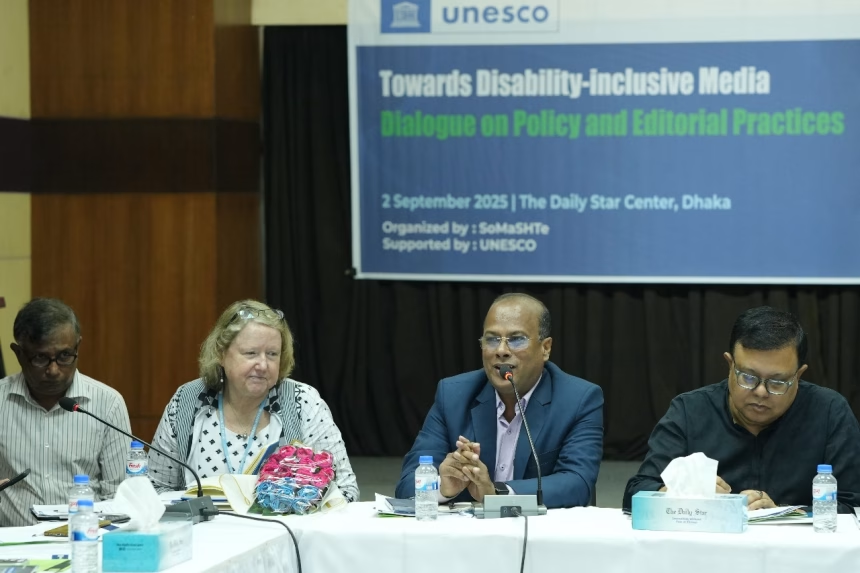Ahead of the upcoming national election, media professionals have been urged to closely monitor political parties’ commitments and plans regarding people with disabilities.
At an event on Tuesday, speakers emphasised the importance of a socio-cultural shift to uphold the rights of people with disabilities and challenge long-standing negative attitudes. They stressed that the more proactive and sensitive the media becomes in addressing disability issues, the more positive changes will occur in political, institutional, and societal structures.
To achieve this, the integration of disability-related content into editorial policies and practices of media houses is essential.
The call was made during a dialogue titled “Towards Disability-Inclusive Media: Dialogue on Policy and Editorial Practices,” held today in Dhaka. The event was organized by a media and communication-focused organisation, with support from the UNESCO Dhaka Office. It focused on advancing inclusive practices based on UNESCO’s practical guidelines on disability equality in the media.
Moderated by Dhaka Tribune Editor Riaz Ahmad, the event featured Dr Susan Vize, UNESCO Representative to Bangladesh, as the chief guest, and Muhammad Hiruzzaman, Director General of the National Institute of Mass Communication, as the special guest. The dialogue brought together policy-level representatives from media organisations, journalist associations, and development practitioners.
Mir Masruruzzaman, Executive Director of Somosti, presented a summary of the Bangla adaptation of UNESCO’s practical manual, while Vaskar Bhattacharjee, National Consultant of the a2i project, discussed the accessibility of media content for people with disabilities and shared practical steps for making online content more accessible.
Dr Susan Vize noted, “Historically, disability has been perceived as a curse in society. Media can play a powerful role in changing this perception. As long as these attitudes persist, there will be discrimination and barriers, whether at the individual or policymaking level.” She added, “Raising awareness is necessary, but not enough. Now is the time for action, and the media must lead this responsibility.”
Muhammad Hiruzzaman commented, “We are committed to including special sessions on disability in our training programs for journalists and media professionals to ensure more sensitive, responsible, and inclusive reporting.”
Riaz Ahmad emphasised, “To bring about change in disability-related editorial policies and newsroom practices, we need to invest not only in journalists but also in the capacity of newsroom staff and management. Sustainable cultural change in the media will occur only when everyone in the institution shares the knowledge, skills, and commitment to inclusive reporting.”
Vaskar Bhattacharjee further added, “It is crucial to assess the current state of accessibility and the management of disability issues in media organisations, and to implement capacity development programs to address these challenges.”
The panel discussion featured prominent figures such as senior journalist Sohrab Hasan, Channel I’s Chief Executive Editor M Zahid Newaz Khan, writer and journalist Shahnaz Munni, Jugantor’s Shuchi Syed, Manabzamin’s Kajol Ghosh, BFUJ’s Arfanul Haque Nahid, CRAB’s M M Badsah, National Press Club’s Shahnaz Begum Poly, BJC’s Shahnaz Sharmin, DRU’s Nadia Sharmin, Women Eye’s Rita Bhowmik, The Daily Star’s Nilima Jahan, B-SCAN’s Sumona Khan, Sightsavers’ Ayon Debnath, SRS’s Sikandar Ali Mina, Urban’s Arifuzzaman, among others.
At the conclusion of the event, participating journalists signed a pledge to adhere to the practical guidelines in their professional practices.


